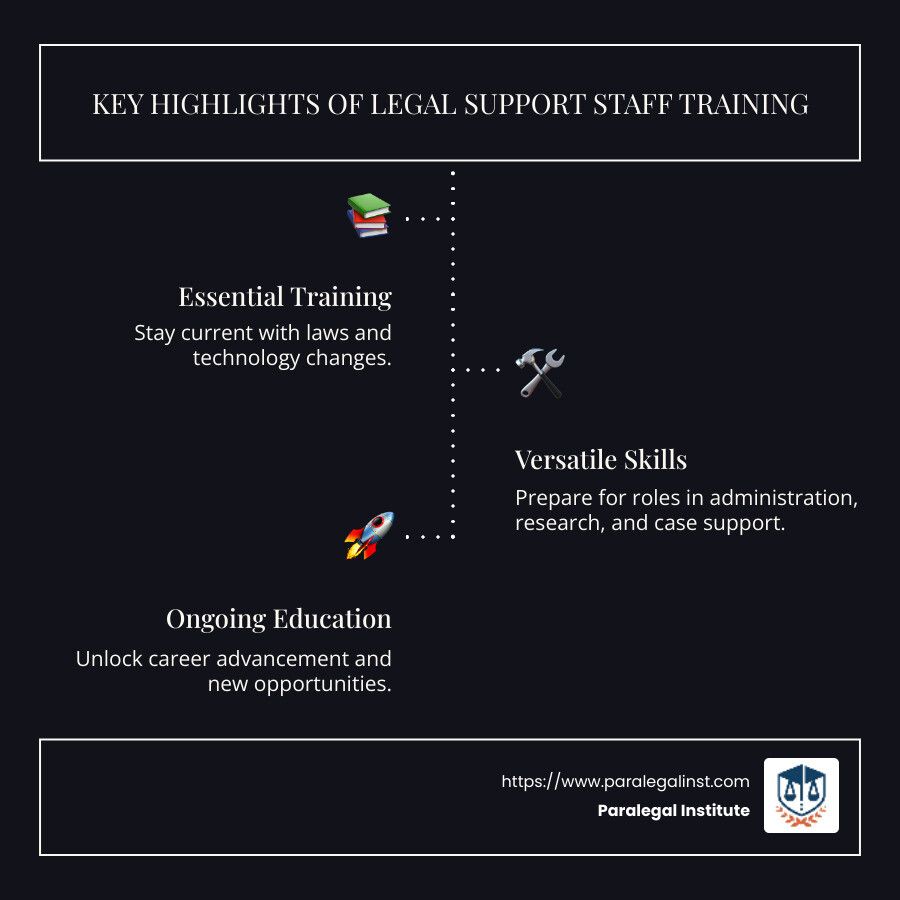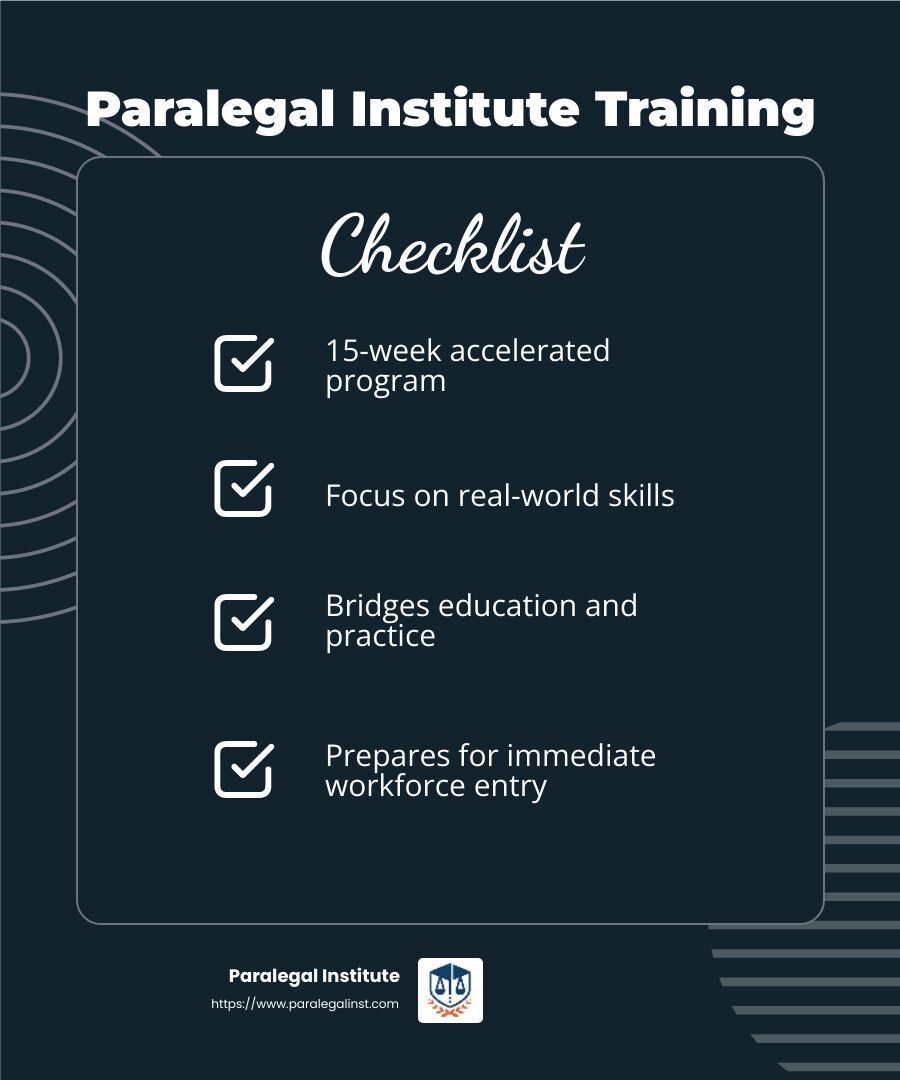Legal Support Staff Training: What the Pros Say
Legal support staff training is essential for anyone aiming to thrive in the dynamic world of law. As a legal support professional, you’ll find yourself juggling tasks from administrative support to conducting crucial legal research. Here are some key points to remember:
- Essential Training: Keeps you up to date with laws and technology.
- Versatile Skills: Prepares you for various roles—administrative, research, and case support.
- Ongoing Education: Opens doors for career advancement and new opportunities.
Incorporating diverse training opportunities helps legal support staff adapt swiftly to changes and improve their performance in a fast-moving legal environment. At the Paralegal Institute, we offer comprehensive training that equips you with the skills to confidently step into the legal field.
I'm Matthew Pfau. My experience includes hiring and training at my own law firm, where I finded my passion for legal support staff training. Join us as we explore how expanding your skills through custom training can set you on the path to success in the legal industry.

Understanding Legal Support Staff Roles
Legal support staff play a crucial role in the smooth operation of a law firm. Let's break down the key roles: legal assistants, paralegals, and those providing administrative support.
Legal Assistants
Legal assistants, often called legal secretaries, are the backbone of a legal team. They handle a variety of tasks that keep the office running smoothly. These tasks can include scheduling appointments, managing correspondence, and organizing files. They are the first point of contact for many clients, making their role vital in maintaining client relationships.
Paralegals
Paralegals are the right-hand partners to attorneys. They perform more substantive legal work than legal assistants. Their tasks include conducting legal research, drafting documents, and preparing for trials. Paralegals must have a strong understanding of legal procedures and substantive law, which is why earning a Paralegal Certificate is so important. It equips them with the necessary skills to support attorneys effectively.
Administrative Support
Administrative support staff ensure that the day-to-day operations of a law office run without a hitch. They manage office supplies, handle incoming and outgoing mail, and take care of the logistical needs of the office. Their role, though often behind-the-scenes, is indispensable to the efficiency of a legal team

Why Training Matters
Training for these roles is not just beneficial—it's essential. Legal support staff need to be well-versed in the latest legal software, understand new laws, and adapt to evolving office technologies. Continuous education ensures they stay competent and competitive in their roles.
By understanding and appreciating the distinct roles of legal assistants, paralegals, and administrative support, you can better prepare for a successful career in the legal field. Each role has its own unique challenges and opportunities, making legal support staff training a key investment in your professional journey.
Legal Support Staff Training: Key Components
To excel in legal support staff roles, training must cover three core areas: procedural skills, legal substantive knowledge, and case management. Let's break these down.
Procedural Skills
Procedural skills are the backbone of any legal support role. They include understanding how to file legal documents correctly, manage deadlines, and adhere to court protocols. These skills are essential because they ensure that legal processes are followed accurately and efficiently, reducing the risk of errors that could impact a case.
Training in procedural skills often involves hands-on practice. For instance, a 15-week course at the Paralegal Institute immerses students in real-world scenarios. They learn the rules of Civil Procedure, how to using the court's filing system, and how to calculate deadlines. This practical approach helps trainees understand the step-by-step procedures involved in legal work.
Legal Substantive Knowledge
Legal substantive knowledge is about understanding the law itself. This includes areas like torts, contracts, and criminal law. For paralegals, having a deep understanding of these topics is crucial. It enables them to conduct thorough legal research and draft documents that are both accurate and persuasive.
Courses at the Paralegal Institute cover these subjects extensively, ensuring that students gain a comprehensive understanding of the laws they will work with. This knowledge forms the foundation of a paralegal's ability to support attorneys effectively.
Case Management
Case management is the art of keeping a legal case on track. It involves organizing documents, scheduling meetings, and ensuring that all parts of a case are moving forward as planned. Effective case management is vital for maintaining the flow of information and ensuring that deadlines are met.
Training in case management often includes learning to use legal software for document management and time tracking. These tools help legal support staff keep everything organized and accessible. And, implementing such technology can significantly improve workflow efficiency.
In summary, mastering these key components through legal support staff training is essential for anyone looking to succeed in this field. By focusing on procedural skills, legal substantive knowledge, and case management, you can build a strong foundation for a successful career in legal support.
Online Legal Support Staff Training Options
In today's world, online learning has become a game-changer for legal support staff training. It offers flexibility and convenience, allowing you to learn at your own pace from anywhere.
Flexible Education
Online training programs are perfect for busy professionals. You can choose from live sessions or self-study options, fitting your learning around your schedule. This flexibility means you can continue working while upgrading your skills.
For instance, the Paralegal Institute offers online certificate courses. These online courses allow students to attend live lectures from the comfort of their home or office. This approach ensures that you can learn whenever it suits you best.
Online Learning Platforms
The Paralegal Institute offers online courses that are both comprehensive and engaging. Their curriculum is designed to cover essential areas such as procedural skills, legal substantive knowledge, and case management. By enrolling in these courses, you gain access to a wealth of resources and expert insights.
Moreover, online training often includes interactive elements like quizzes and discussion forums. These tools improve learning by allowing you to test your understanding and engage with peers and instructors.
The Bottom Line
Online legal support staff training is an invaluable resource for anyone looking to advance in their career. It combines flexibility with comprehensive content, making it easier than ever to gain the skills and knowledge needed in the legal field. Accept this modern approach to learning and take the next step in your professional journey.
Benefits of Legal Support Staff Training
Legal support staff training is more than just a checkbox on your career to-do list. It's a powerful tool for career development, skill improvement, and continuing education. Let's break down how these benefits work for you.
Career Development
Training opens doors. By acquiring new skills and knowledge, you increase your chances of getting promotions or landing that dream job. Employers value staff who are well-trained and up-to-date with the latest legal developments.
A well-rounded training program, like those offered by the Paralegal Institute, prepares you for various roles within a legal team. From understanding the nuances of legal procedures to mastering case management, these skills make you a valuable asset.
Skill Improvement
The legal field is always changing. New laws, technologies, and practices emerge regularly. Keeping your skills sharp is crucial. Training helps you stay current and competitive.
Continuing Education
Continuing education is key to long-term success in the legal field. It's not just about meeting state bar requirements; it's about investing in your future. Training programs often qualify for continuing education credits, which can be essential for maintaining your professional credentials.
Moreover, ongoing education shows commitment to your career. It reflects a proactive approach to professional growth, making you stand out in the job market.
Legal support staff training is an investment in yourself. It improves your skills, boosts your career prospects, and keeps you informed about the latest trends in the legal world. Accept training as a pathway to success and watch your career flourish.
Frequently Asked Questions about Legal Support Staff Training
How do I become a legal support worker?
Becoming a legal support worker involves a few key steps. First, you can earn a Paralegal Certificate. The Paralegal Institute offer comprehensive courses that cover the essential skills and knowledge needed.
Is a legal assistant higher than a paralegal?
In the legal world, roles can sometimes be confusing. While both legal assistants and paralegals play crucial roles, they have different responsibilities and levels of expertise.
- Legal Assistants often focus on administrative tasks, such as scheduling, document preparation, and client communication.
- Paralegals, on the other hand, usually handle more complex legal work, including research, drafting legal documents, and assisting attorneys with case preparation.
The distinction often lies in the level of legal substantive knowledge required and the complexity of tasks performed. However, both positions are vital to the smooth operation of a legal team.
What are the training options for legal support staff?
Training options for legal support staff are diverse and flexible. Here's a look at some popular pathways:
- Internships: These provide hands-on experience and are an excellent way to learn on the job. Internships offer a glimpse into daily operations and help you understand the practical aspects of legal work.
- Paralegal Credentials: Earning a Paralegal Certificate through programs like those offered by the Paralegal Institute is a solid step. These programs equip you with the necessary skills and knowledge to excel in a legal support role.
- On-the-Job Training: Many firms offer training for new hires. This allows you to learn specific procedures and software used in that particular office, tailoring your skills to meet their needs.
- Continuing Education: Engaging in ongoing training and education is crucial. It helps you stay current with new laws, technologies, and best practices. Many training programs also qualify for continuing education credits, which can be essential for maintaining your professional credentials.
ith these options, you can tailor your training to suit your career goals and the demands of the legal field. Legal support staff training isn't just about getting a job—it's about building a career.
Conclusion
The journey to becoming an effective legal support professional doesn't end with earning a Paralegal Certificate. It's about continuous growth and practical application of skills. At the Paralegal Institute, we understand the importance of equipping our students with the tools they need to excel in the legal industry.
Our accelerated curriculum is designed with input from practicing legal professionals. This ensures that our students gain hands-on experience and are ready to enter the workforce immediately upon graduation. We offer a 15-week program that focuses on real-world skills like document drafting, case preparation, and legal research, preparing graduates to make immediate contributions in legal environments.
Our unique approach combines practical skills with academic knowledge, bridging the gap between traditional education and the demands of modern legal practice. This method not only prepares students for their first job but also sets them up for long-term career success.
For those looking to improve their skills and advance their careers, our program is a stepping stone to becoming an indispensable part of any legal team. If you're ready to take the next step in your career, explore our courses today and find how we can help you achieve your professional goals.











